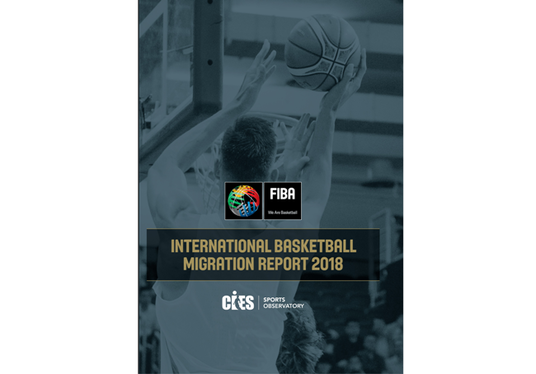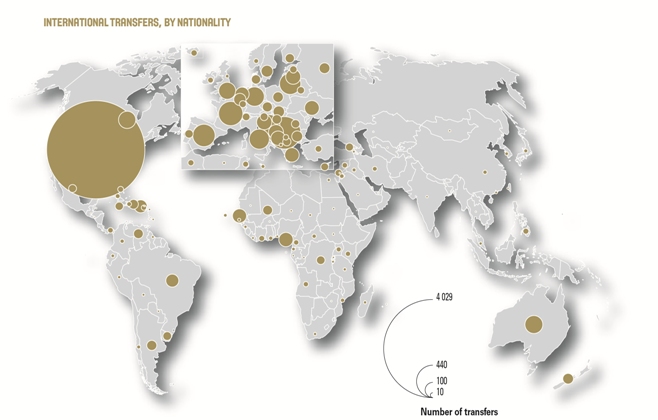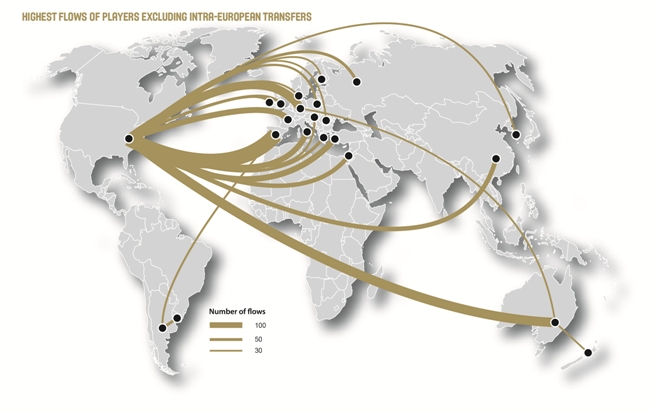
MIES/NEUCHATEL, Switzerland - The International Centre for Sports Studies (CIES) and FIBA have issued the seventh edition of the International Basketball Migration Report (IBMR), a seasonal insight into the migratory trends and tendencies of the sport.
This edition of the report - which covers the 2017-18 basketball season (July 1, 2017-June 30, 2018) - makes the most of the highly-productive and comprehensive fusion of FIBA's data on international transfers and the renowned analytical expertise of the CIES Observatory to showcase the patterns of the international migration of players.
Click here to download the full report.
Some of the main findings include:
For the first time since 2010-11, there was a decrease in the number of transfers for both men and women.
We noticed, that while the number of players involved in transfers is similar to past seasons, they are moving less often, with the figure for those transferring only once increasing from 77.5 percent to 91.6 percent. It presumes that, due to a challenging economic climate, clubs are more likely to stick with their original player choices.
The USA remain the biggest exporters of players, followed by Eastern European countries and African nations. Interestingly, the latter also get exported players back as imports after they have been abroad to further their basketball development. Western and Central European countries still import foreign talent, seeing it as the best strategy to improve their respective national leagues.

High number of foreign players and increase in different nationalities represented within national leagues
The number of foreign players has remained high, with 7 of the 16 leagues featured in the report counting more foreigners than nationals. Spain remains the league with the highest share of foreign players (68.2 percent) and highest number of different nationalities represented (46). At the other end of the spectrum, the Brazilian League once again boasts the lowest share of foreigners (18.6 percent) and of different nationalities represented (9).
In general, the playing time of foreign players remains high across all 16 leagues and strengthens the notion that their presence contributes to the limited development of national players.
Limited development opportunities within leagues for homegrown U21 players
The inclusion of Japan in this edition of the report brings with it a significant decrease in the average figures for homegrown U21 players. Only 1.2 percent of players in Japan fall in this category and play on average just 2 minutes a game while the league is gradually becoming an attractive destination for top-level foreign players.
Decrease in number of international players in the NBA
For the first time since the NBA lockout in 2011, the number of international players in the world's biggest league is on the decrease. American players in the NBA have increased from 75 percent to 80 percent, with international players consequently falling from 25 percent to 20 percent.

CIES - The International Centre for Sports Studies
Creating an impact on the way sport is managed worldwide.
The International Centre for Sport Studies (CIES) is an independent study centre located in Neuchâtel, Switzerland. It was created as a foundation in 1995 by the Fédération Internationale de Football Association (FIFA), the University of Neuchâtel and the City and State of Neuchâtel. Using a multi-disciplinary approach (law, sociology, geography, history and management), CIES provides research, top-level education and consulting services to the world of sport. For further information visit cies.ch.
About FIBA
FIBA (fiba.basketball) - the world governing body for basketball - is an independent association formed by 213 National Basketball Federations throughout the world. It is recognised as the sole competent authority in basketball by the International Olympic Committee (IOC).
For further information about FIBA visit fiba.basketball or follow FIBA on facebook.com/fiba, twitter.com/fiba, instagram.com/fiba and youtube.com/fiba.
This website uses cookies – limited to technical and analytical cookies – in order to allow your browsing and enhance your experience.
For more information, please see our cookie policy and our privacy notice.